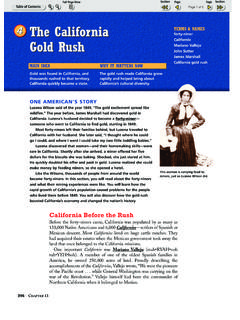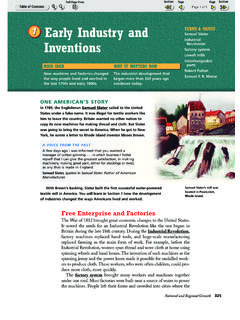Transcription of 1 The Early Years of the War - Mr Thompson
1 The American Revolution17711 MAIN IDEAWHY IT MATTERS NOWThe Early Years of the WarThe Early Years of the WarTERMS & NAMESG eorge WashingtonmercenarystrategyrendezvousBat tles of SaratogaAmericans DividedThe issue of separating from Great Britain divided American society. Opinion polls did not exist in the1700s, so we don t know exactly how many people wereon each side. But historians estimate that roughly 20 to30 percent of Americans were Loyalists, roughly 40 to45 percent were Patriots, and the rest remained Americans did not support the Patriots and Loyalists came from all walks oflife and all parts of America. In general, New Englandand Virginia had high numbers of Patriots. Loyalistswere numerous in cities, in New York State, and in theThe American desire to gain rightsand liberties led them to fight forindependence from those same rights and libertiesare protected by the AMERICAN S STORYIn search of liberty, Haym Salomon moved from eastern Europeto America sometime between 1764 and 1775.
2 He was a Jewfrom Poland. Arriving in New York City, Salomon soon becamea successful merchant and banker. After the war broke out,Salomon supported the Patriot the British captured New York in 1776, many Patriotsfled but Salomon stayed. The British arrested him as a spoke many languages. The British thought he couldhelp their supply officers deal with foreign merchants, so theylet him out of prison. Salomon used this opportunity to helpother prisoners 1778, the British wanted to arrest Salomon again, so hefled to Philadelphia. His earlier time in the cold, damp prisonhad permanently damaged his health. Even so, he continued to aid the Patriots. He loaned the new government more than $600,000,which was never Salomon, many people made hard choices about which side to support during the Revolutionary War. This section discusses thosechoices and the obstacles Americans faced in the war s Early Salomon sacrificed hishealth and his fortune to help his new :Blackwell Encyclopediaof the American RevolutionChoosing Sides176-183US8P R U2C07S1 11/26/02 12:17 PM Page 177 South.
3 Many Loyalists worked for the British government or wereclergy in the Church of England. Some Quakers were Loyalists,although many wanted peace. (Their faith taught that war was wrong.)The war divided Native Americans, too. For instance, someIroquois nations fought with the British and others with theAmericans. Those Native Americans who joined the British fearedthat if the Americans won, they would take Native American Native Americans who lived near colonists and interacted withthem sided with the Americans also fought on both sides. At first, slave ownersfeared that African Americans who had guns might lead slave , few states allowed African Americans to enlist, or sign upwith the army. Then a British governor offered freedom to any enslavedperson who joined the British army.
4 Many slaves ran away to fight forthe British. In response, most states began to accept African-Americansoldiers. In all, about 5,000 African Americans servedin the Continental Army. Many African Americanswho did so hoped that American independence wouldbring greater over the war split families, too. Forexample, Benjamin Franklin s son William tookBritain s side. The father and son stopped an ArmyBecause not everyone supported the war, raising anarmy was difficult. The army also faced other prob-lems. In June 1775,George Washingtonbecame thecommander of the Continental Army. At first, thisnew national army was formed from state militias,made up of untrained and undisciplined Congress created the Continental Army, menbegan to enlist, but most of them didn t stay long. Atthe start of the war, Congress asked men to enlist onlyfor one year .
5 Later Congress did lengthen the term ofservice. When the soldiers time was up, they wenthome. As a result, Washington s army never num-bered more than 17,000 s inability to supply the army also frus-trated Washington. The soldiers needed everything blankets, shoes, food, and even guns and , Washington wrote, Could I have foreseenwhat I have, and am likely to experience, no consider-ation upon earth should have induced [persuaded] meto accept this command. Many women tried to help the army. MarthaWashington and other wives followed their husbands toarmy camps. The women cooked, did laundry, and178 CHAPTER7 GEORGE WASHINGTON1732 1799At the age of 16, GeorgeWashington worked as a sur-veyor, setting land boundaries inthe wilderness. He learned tohandle hardship by hunting forfood and sleeping the French and Indian War,Washington had many brusheswith death.
6 Yet he wrote, Iheard the bullets whistle, and,believe me, there is somethingcharming in the sound. That war made him the mostfamous American officer. Peopleloved him for his courage. Ascommander of the ContinentalArmy, Washington s popularityhelped unite did Washington s earlylife prepare him to lead thearmy?BackgroundThe IroquoisLeague had gen-erally kept peaceamong theIroquois nationsfor about 200years until AnalyzingCausesWhywould the lack ofagreement aboutthe war make ithard to raise anarmy?A. PossibleResponsesOnlyPatriots wouldjoin the army, andthey were aminority. SomePatriots mighthesitate to join ifmost of theirneighbors R U2C07S1 11/26/02 12:17 PM Page 178nursed sick or wounded soldiers. A few women even helped Hays earned the nickname Molly Pitcher by carryingwater to tired soldiers during a battle. Deborah Sampson dressedas a man, enlisted, and fought in several an army was crucial to Washington s plan.
7 To theBritish, the Americans were disorganized, inexperienced British thought that if they won a decisive battle, theAmericans would give up. By contrast, Washington s main goalwas to survive. To do so, he needed to keep an army in the field,win some battles no matter how small and avoid a crushingdefeat. He knew he could not hope to win a major battle until hehad a large, well-equipped for the Middle StatesAs Chapter 6 explains, Washington had forced the British to retreatfrom Boston in March 1776. He then hurried his army to New YorkCity, where he expected the British to go next. One British goal was tooccupy coastal cities so that their navy could land troops and supplies inthose cities. From there, they could launch their military s hunch was correct. In July 1776, Britain s GeneralWilliam Howe arrived in New York with a large army.
8 Then in August,more soldiers arrived, including about 9,000 Hessian mercenaries. Amercenaryis a professional soldierhired to fight for a foreign soldiers usually signed up forlife which discouraged Britain needed mercenaries, whomit hired from the German several months, the British andAmerican armies fought for NewYork State. Finally, the British forcedWashington to retreat through NewJersey. By December, when the Amer-ican army crossed the Delaware Riverinto Pennsylvania, it was in terriblecondition. Charles Willson Peale, aPhiladelphia painter who watched thecrossing, saw one muddy soldier who had lost all his clothes. He was in anold, dirty blanket jacket, his beardlong, and his face so full of sores hecould not clean it. To Peale s shock,the soldier called his name. He wasPeale s brother!
9 Political writer Thomas Paine alsowitnessed the hard conditions and thesoldiers low spirits on the retreat. ToBackgroundThe British-hiredmercenaries camefrom a part ofGermany calledHesse, which isthe origin of theterm Miles200 Kilometers 75 W70 W80 W40 N45 NWashingtonWashingtonHoweMorristownPhila delphiaBostonNew (part ofMass.) forcesBritish forcesAmerican victoryBritish victoryWar in the Middle States, 1776 1777 GEOGRAPHY SKILLBUILDERI nterpreting what state did the American victories take place? did the British general Howe travelfrom New York to Brandywine?B. SolvingProblemsHowdid Washingtontry to solve theproblem of lead-ing a small, inex-perienced forceagainst a largeprofessionalarmy?B. AnswerHedecided theimportant thingwas to survive,even if he didn twin any big bat-tles. He was buy-ing time until hecould build a bet-ter sailed fromNew York, downthe coast, and thenup Chesapeake Hessianboots weighedabout 12 poundsa R U2C07S1 11/26/02 12:17 PM Page 179urge them to keep fighting, Paine published the first in a series of pam-phlets called The American VOICE FROM THE PASTT hese are the times that try men s souls.
10 The summer soldier and the sunshinepatriot will, in this crisis, shrink from the service of their country; but he thatstands it now,deserves the love and thanks of man and Paine,The American CrisisWashington hoped a victory would encourage his weary men. He alsoknew that he must attack the British quickly because most of his soldierswould leave once their enlistments ended on December on December 25, 1776, Washington s troops rowed across the icyDelaware River to New Jersey. From there, they marched in bitter, Early -morning cold to Trenton to surprise the Hessians, some of whom weresleeping after their Christmas celebration. The Americans captured orkilled more than 900 Hessians and gained needed s army won another victory at Princeton eight days victories proved that the American general was better than theBritish had thought.







